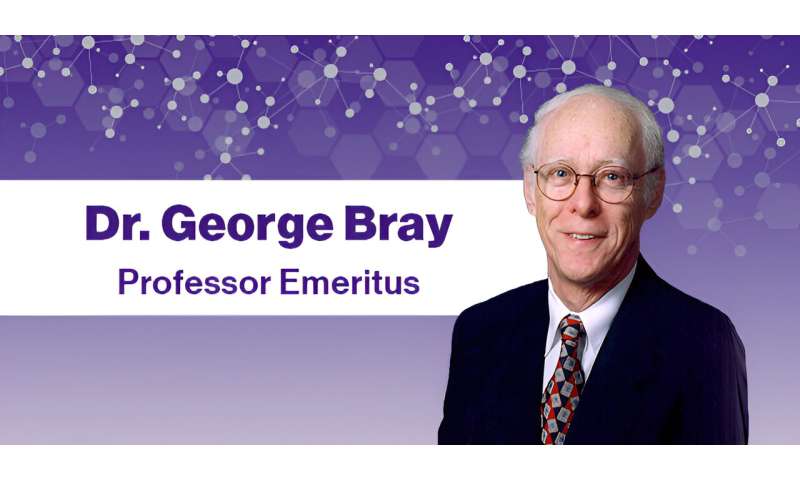Pennington Biomedical Professor Emeritus Dr. George Bray Publishes 100-Year History of Obesity Research

Published in the International Journal of Obesity, a division of Nature, the paper lays out a high-level history of the science community's understanding obesity and its treatments
Dr. George Bray has dedicated his professional life to researching obesity and metabolism, serving as the first executive director of Pennington Biomedical Research Center in 1989. Now as professor emeritus, his most recent publication explores the extensive history of obesity research over the past 100 years and prior.
Published in the International Journal of Obesity, a journal in the portfolio of Nature magazine, "Obesity: a 100-year perspective" tracks early explorations into the field, the emergence of structured research around obesity, and a series of lessons gleaned from a high-level view of this history.
"While it has been repeatedly shown that diets only work when followed or that medications only work when taken, it is key to remember that obesity is a chronic, relapsing and progressive disease process, an idea that was discussed as early as 1760," said Dr. Bray. "We are living in a rapidly evolving period of obesity research and the subsequent emergence of medication interventions. This publication steps back and shows how we reached this point, and how key milestones that shaped facets from the research field to public perception of obesity."
In laying out the history of obesity research, Dr. Bray explained how the understanding of obesity has long and extensive roots, with Hippocrates noting its association with ill-health as early as 500 B.C., but the scientific research developed in earnest over the past two centuries. First expanding on early attempts to scientifically measure and quantify obesity, he then describes the histories behind identifying fat cells as energy storage receptacles, identifying the phenotypes of obesity, and the theories of what drive hunger. He elaborates on early dietary approaches to obesity, and the emergence of efforts to treat obesity through medicine and surgery.
Dr. Bray also features the more recent and important history of identifying obesity as a public health problem, with the American insurance industry serving as early pioneers in establishing mass media campaigns to inform the public of obesity's risks. Around this time, American medical journals were beginning to publish articles on obesity, with the first physicians' association focusing on obesity, The National Glandular Society, forming in 1950.
Though he does not specifically include it, Dr. Bray's examination of the formation of obesity research in terms of societies, congresses and journals naturally implies the growth of dedicated research facilities in the mid- to late 20th century, including Pennington Biomedical.
"Dr. Bray is a living legend, and here at Pennington Biomedical, we are sustaining his legacy of research into obesity, metabolism and nutrition," said Dr. John Kirwan, Executive Director of Pennington Biomedical. "As Dr. Bray laid the foundation of the research conducted here at Pennington Biomedical, it is fitting that his recent paper highlights the foundational moments that have driven the growth of this research field. He illuminates the discoveries and emerging techniques with his trademark aphorisms. Researchers of obesity and metabolism, both here and elsewhere, are indebted to Dr. Bray for his lifetime of research that we continue to work from today."
Dr. Bray concludes the paper with a collection of aphorisms that he developed while observing reoccurring patterns in his research. Such key observations include that all treatments of obesity produce variable, yet unpredictable weight losses, and that food intake activates pleasurable or pseudo-addictive pathways, making the control of food intake difficult.
Throughout his extensive career, Dr. Bray has gained international recognition for his pioneering research of obesity and diabetes on both the experimental and clinical levels. His leadership at Pennington Biomedical grew the facility from a handful or researchers and a modest budget to worldclass research center, resplendent with advanced laboratories, equipment, 70 scientists, nearly 500 total employees and a multimillion-dollar budget. He also ranks among the most cited scientists globally, according to the Google Scholar Citations database.
Provided by Louisiana State University